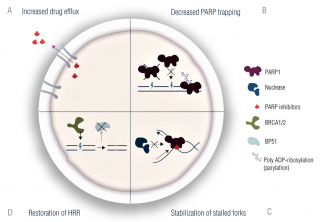
E-Learning: Treatment sequencing for mCRPC patients within the changing landscape of mHSPC
E-Learning: Treatment sequencing for mCRPC patients within the changing landscape of mHSPC
Assoc. Prof. Alicia Morgans, Prof. Gerhardt Attard
As a result of the success of the Experts Knowledge Share meeting during ESMO 2019, GU CONNECT has turned the educational programme into an interactive e-learning. Watch the video and then take the e-learning for your CME credit.
Assoc. Prof. Alicia Morgans
Medical Oncologist
Dana-Farber Cancer Institute
United States (US)
Assoc. Prof. Alicia Morgans has received financial support/sponsorship for research support, consultation, or speaker fees from the following companies:

Prof. Gerhardt Attard
Medical Oncologist
University College London Cancer Institute
United Kingdom (UK)
Prof. Gerhardt Attard has received financial support/sponsorship for research support, consultation, or speaker fees from the following companies:
E-learning |
5 min
|
2019
This programme was made for you: your opinion matters
Share your feedback in just 4 clicks and help us to continue to create the content you need.
I agree that this educational programme:
Was valuable to me:
1/4
Has improved my knowledge of this topic:
2/4
Is likely to change my clinical practice:
3/4
Was balanced and unbiased:
4/4
download resources
This programme was made for you: your opinion matters
Share your feedback in just 4 clicks and help us to continue to create the content you need.
I agree that this educational programme:
Was valuable to me:
1/4
Has improved my knowledge of this topic:
2/4
Is likely to change my clinical practice:
3/4
Was balanced and unbiased:
4/4
Experts knowledge share, EMSO 2019
Following the success of the Experts Knowledge Share during ESMO 2019, GU CONNECT has created an interactive e-learning course with CME credit available based on the meeting. Expert knowledge was shared on treatment options and the sequencing of drugs in patients who have been treated first for hormone-sensitive prostate cancer (HSPC) and then developed castration-resistant prostate cancer (CRPC). In this video and accompanying slides Dr Cora Sternberg, Dr Gert Attard, and Dr Alicia Morgans discuss the meeting highlights and practical guidance for medical urological oncologists.
Developments in prostate cancer treatment
Dr Sternberg gives an overview of the changing landscape of mHSPC with slides covering disease progression and treatment options. Treatment is examined across the disease continuum: for hormone-sensitive prostate cancer, non-metastatic castration-resistant prostate cancer (nmCRPC), and metastatic CRPC (mCRPC). Mechanisms of action for abiraterone, enzalutamide, and apalutamide are described. Dr Sternberg expands on treatment options in a timeline scenario for suggested use of docetaxel, sipuleucel-T, and radium-223. Drug trial data from the CHAARTED trial, STAMPEDE trial, and LATITUDE trial are examined. In addition, an overview of metastatic hormone-sensitive prostate cancer (mHSPC) studies; TITAN looking at APALUTAMIDE, ARCHES and ENZAMET looking at enzalutamide.
Treatment choices following docetaxel treatment
Dr Gert Attard discusses mCRPC treatment choices for men who received docetaxel at the start of androgen deprivation therapy (ADT). The presentation covers case studies for patients with high to low volume metastatic HSPC. Treatment options such as abiraterone, enzalutamide, docetaxel, radium-223 F, cabazitaxel, and stereotactic body radiation therapy (SBRT) are considered with a focus on treatment sequence.
The important role of mechanisms of action when treating prostate cancer
Dr Alicia Morgans discusses an approach to first- and second-line treatment for mCRPC patients following abiraterone treatment for mHSPC. Dr Morgans highlights the importance of selecting treatments with novel mechanisms of action to target drug resistance and presents a critique of the evidence for sequencing therapies. Consideration is given to clinical factors when choosing a treatment and how to involve patients in shared decision making regarding their treatment options. Dr Morgans presents an example case of a patient given the prior treatment of abiraterone and takes us through the decision making for subsequent treatment options covering criteria, patient preferences, and suitable supportive care. Gain knowledge and benefit by taking the e-learning module to gain your CME credits.
GU CONNECT is an initiative of COR2ED, supported by an Independent Educational Grant from AstraZeneca, Bayer and Eisai Europe Limited.


































